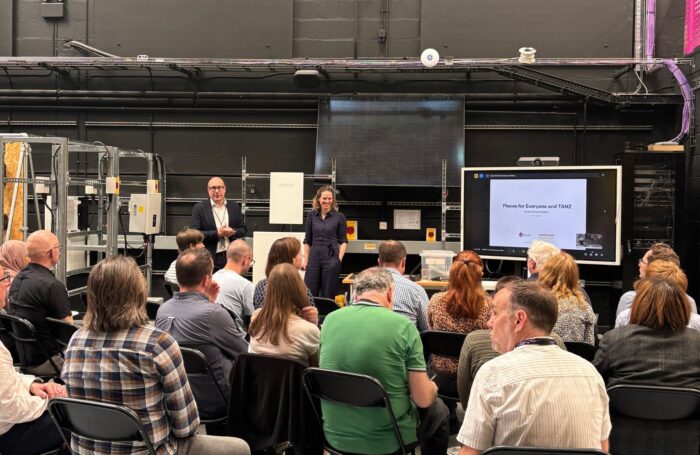
In terms of car ownership and shift needed to a clean air solution, I have been driving a hybrid self-charging vehicle for over 6 years now but would like to move to full electric, however I live on a terraced street without guaranteed parking in front of my home. Are solutions being looked for such dilemmas? Will councils assist with encouraging transitions? Of course, public transport is the first option but families still need flexibility of access to a car. Thank you. Based in Chadderton in Oldham.
We recognise the large challenge in Greater Manchester around on street charging provision, particularly with the high numbers of properties without off street parking. We are currently investigating a number of options including provision of community charging hubs and are continuing to have dialogue with government and local stakeholders around both funding and the best approach for on street charging.
The public GMEV charging network (now Be.EV) has recently been through an infrastructure upgrade and we are seeking opportunities to expand the existing network, the network remains free to charge at present.
Two of the barriers to electric car roll-out are initial cost and the chaotic public charging network. I don’t know what GMCA can do about the former, but in respect of the latter, how can GMCA/TfGM increase the availability of charging points and reduce the number of payment systems? How does the transfer to Be.EV help? Is Be.EV going to join a common payment platform like Zap Pay?
We recognise the challenge in Greater Manchester of providing adequate charging network provision. The public charging network has recently been through an infrastructure upgrade as part of the change to Be.EV and we are seeking opportunities to expand the existing network, the network remains free to charge at present. The new Be.EV network will be available via WebPay. So you don’t need to be a member to access them. Just have a smartphone to hand. All new rapid chargers will be fitted with contactless payment machines also.
We are also continuing to have dialogue with government and local stakeholders around both funding and the best approach for expanding charging provision. For example GMCA recently submitted a response to the government’s consultation on bringing forward the sales ban on fossil fuel vehicles, as part of a supportive response we have made clear that EV cost reduction measures and local funding for public charging need to increase and be accelerated to support residents in the transition.
Are councils that have been reluctant to build temporary cycle infrastructure risking being at the back of the queue for future funding?
This would be a question for the Department for Transport.
What about the Walkers! – My question for the transport panel, is what do they think needs to be done to enable people to walk more in their everyday lives and for health and leisure in Greater Manchester.
We recognise that walking trips are the easiest way to travel short trips for the majority of residents and that if active travel and public transport are to be the first, natural choice, then they must also be the most convenient and cost-effective ways to travel.
Place-based solutions are fundamental to delivering this, creating attractive walkable residential areas that encourage shorter walk-trips instead of longer car-trips. To deliver this £85m will bring 55 miles of protected routes and 140 new crossings to roads across Greater Manchester by the end of 2021. As part of this investment initial planning has begun to introduce low traffic neighbourhoods in Trafford and Tameside.
We are also working closely with Greater Manchester Moving and partners to support measures to enable and promote walking and to understand barriers. This involves engaging with residents to encourage walking both for utility and leisure, in groups or alone, for example the GM walking festival is currently taking place, more details can be found at https://gmwalking.co.uk/festival/
Are electric cars a sustainable way to travel?
Our aim is to make cycling, walking and public transport the natural and easy choice for journey’s in and around GM, these are most sustainable ways to travel in terms of greenhouse gas, air pollutant emissions and embodied energy for vehicles and infrastructure. Where journeys require a vehicle, we aim to support efficiency and sustainability by encouraging the use of car clubs, car sharing and low and zero emission tailpipe solutions such as electric vehicles. Whilst electric vehicles are only a part of the solution, they are preferable to fossil fuelled vehicles, this is because per km travelled, they emit far less equivalent emissions from grid supplied electricity, this is mainly due to improvements in decarbonising electricity generation. Whilst electric vehicles have higher production emissions than fossil fuelled cars multiple studies have shown that, in the UK, the whole life emissions of electric vehicles are lower than fossil fuelled cars.
Lower traffic speeds are vital for encouraging more people to walk and cycle. Speed limiting technology will be mandatory in all new vehicles from 2024. Should we be looking at reducing the default speed limit to 20mph across the GMCA before then?
We recognise that the targets can only be achieved through a reduction of passenger kilometres travelled and a rapid shift to zero emission technologies, in particular, challenging reductions in car travel are likely to be necessary. It is Government policy that will underpin delivery of these changes, we need consistency so that regions and localities can deliver to make rapid, meaningful progress in reducing transport’s contribution to the climate emergency. If active travel and public transport are to be the first, natural choice, then they must also be the most convenient and cost-effective ways to travel.
Place-based solutions are fundamental to delivering this, creating attractive walkable residential areas that encourage shorter walk-trips instead of longer car-trips. To deliver this £85m will bring 55 miles of protected routes and 140 new crossings to roads across Greater Manchester by the end of 2021. As part of this investment initial planning has begun to introduce low traffic neighbourhoods in Trafford and Tameside.
Whilst EU legislation has been put forth on speed limiters, the details on implementation are currently limited and discussions between governments and manufacturers appear to be ongoing, there is a possibility they can be deactivated for example, we will be keeping apprised of the implications as they develop, it will also take some time for the technology to become widespread in general vehicle fleets. Support for 20mph limits on local roads will require GMP support, and GMP would require a policy on 20mph enforcement.
Covid-19 has impacts because of social distancing on Public Transport vehicles. What suggestions for still encouraging Public Transport use especially on buses. Would franchising system help?
We are following government guidance on public transport and asking passengers to please be patient, plan ahead – allowing extra time for your journey – and be considerate of other passengers by wearing masks, avoiding touching surfaces where possible, using contactless payment, keeping your distance from other passengers where possible and, where seating arrangements allow, travel side by side or behind other people rather than facing them.
TfGM and public transport operators have put more measures in place to help you travel safely, including enhanced cleaning, extra services and passenger information and signage.
We recognise there will be challenges around public transport perception and potentially changes in travel behaviour post Covid and have been working to make ticketing more flexible, for example we have introduced a trial “clipper” ticket on Metrolink https://getmethere.com/clipper.
In June, GMCA received the results of the Doing Buses Differently consultation and agreed that before a final decision can be taken, it needed to consider the impact the Covid-19 pandemic may have on Greater Manchester’s bus market, the assessment and the consultation. Further work is now being undertaken to assess these impacts and will be submitted to GMCA later this year.
You can read the outcome reports on the consultation online here: https://greatermanchester-ca.gov.uk/what-we-do/transport/doing-buses-dif…
Making public transport safe to use is a big factor for getting people to use it, for those I have spoken to. Are there any plans to make it safer and how can this be achieved?
We are following government guidance on public transport and asking passengers to please be patient, plan ahead – allowing extra time for your journey – and be considerate of other passengers by wearing masks, avoiding touching surfaces where possible, using contactless payment, keeping your distance from other passengers where possible and, where seating arrangements allow, travel side by side or behind other people rather than facing them.
TfGM and public transport operators have put more measures in place to help you travel safely, including enhanced cleaning, extra services and passenger information and signage.
We recognise there will be challenges around public transport perception and potentially changes in travel behaviour post Covid and have been working to make ticketing more flexible, for example we have introduced a trial “clipper” ticket on Metrolink https://getmethere.com/clipper.
The opportunity for transforming towns and cities is at risk because of Local Authorities caving in very quickly to any criticism of changes when low traffic neighbourhoods and better infrastructure for walking and cycling are put in. How can we support these efforts to make real change? Allowing time for these changes to bed in, is key in my view but knee jerk reactions are stopping such innovation.
We recognise that the targets can only be achieved through a reduction of passenger kilometres travelled and a rapid shift to zero emission technologies, in particular, challenging reductions in car travel are likely to be necessary. It is Government policy that will underpin delivery of these changes, we need consistency so that regions and localities can deliver to make rapid, meaningful progress in reducing transport’s contribution to the climate emergency. If active travel and public transport are to be the first, natural choice, then they must also be the most convenient and cost-effective ways to travel.
Place-based solutions are fundamental to delivering this, creating attractive walkable residential areas that encourage shorter walk-trips instead of longer car-trips. To deliver this £85m will bring 55 miles of protected routes and 140 new crossings to roads across Greater Manchester by the end of 2021. As part of this investment initial planning has begun to introduce low traffic neighbourhoods in Trafford and Tameside. You can show support for such schemes by responding to consultations on the project and engaging others in the community to address local residents concerns about these changes.
I have undertaken research using data available on the internet and provided through Freedom Of Information (FOI) requests to the DVLA. I suggest the following for your consideration:
All vehicles registered as Private HGV (taxation class 10) be exempt from Greater Manchester Clean Air Zone (CAZ) charges.
Currently the Greater Manchester proposal for CAZ charges qualifies all HGVs for the commercial vehicle charge of £60 per day.
Private HGVs are used unladen, privately for leisure, equestrian and heritage, or for driver training purposes. Private HGVs are also owned and operated by museums and are included in private vehicle collections. If a vehicle is to be used laden for commercial purposes the Private HGV class does not apply and it must be taxed in the HGV class.
The practical effect of enforcing a commercial CAZ charge for Private HGVs would add unacceptably to the cost of keeping, restoring, maintaining or using a Private HGV vehicle for private purposes. The effect would be all the more devastating if any of these vehicles were kept in the CAZ.
In the North West I calculate there are 5.7K vehicles licenced as Private HGV out of a total 66K HGV licenced vehicles in the area that might travel in the Greater Manchester CAZ on any given day 76 % of the 5.7K Private HGVs in the North West can be accounted for by Motor Home / Caravan (61% = 3,509 vehicles) and Livestock Carriers [horseboxes] (15%)
The total number of Private HGVs licenced in the North West can be further reduced if we assume 18% of the total licenced vehicles are Euro 6 compliant and not likely to incur any CAZ charge.
Currently vehicles with an ‘Historic’ tax classification are exempt from CAZ charges and the total number of Private HGVs vehicles that are not Euro 6 compliant will continue to reduce as ‘Heritage’ vehicles attract an ‘Historic’ tax classification according to the Vehicle Excise Duty 40 year rolling exemption.
Excluding Private HGVs from Greater Manchester CAZ charges is not expected to have any significant environmental impact and would be insignificant in terms of their overall contribution to pollution. Whilst these are relatively highly polluting vehicles compared to the Euro 6 specification, the impact is limited by low vehicle numbers that have a low annual milage with a tendency to travel away from the CAZ.
Having Private HGVs exempt from Greater Manchester CAZ charges is not expected to have any significant macroeconomic impacts with only a very small proportion of the total vehicles wishing to take advantage of any CAZ exemption.
Having Private HGVs exempt from Greater Manchester CAZ charges would have a positive impact for individuals and families who would otherwise find themselves and their vehicle ‘marooned’ by a charge that would render it unaffordable to drive the vehicle.It is not anticipated there would any be impacts on groups sharing protected characteristics. Having Private HGVs exempt from Greater Manchester CAZ charges would have a positive impact on organisations using vehicles for HGV driver training.
If there were to be a CAZ charge there might well be an adverse effect on a number of SMEs (Small and Medium-sized Enterprises) working on maintenance, repair and restoration of these vehicles. There might also be an impact on civil society organisations that use these vehicles to educate the public, support training, rehabilitation and for therapy purposes. For some of these organisations it’s the members, not the organisation, that own the vehicles.Thanks for your comments regarding the Greater Manchester Clean Air Plan proposals.
On Thursday 8 October, the eight-week consultations on the proposals went live. I would encourage you to submit this point to the formal consultation, the online questionnaire and additional information can be found at www.cleanairgm.com
Alternatively you can:
• Email your feedback (directly) to cleanairgm@aecom.com
• Give your feedback via telephone on 0161 244 1100 (you will be forwarded through to our independent research organisation AECOM to submit your response).
• Write/send a completed questionnaire to Freepost
RUBS-XRAT-GLBK, AECOM,
1 New York Street, MANCHESTER, M1 4HD
All responses will go to AECOM – the independent agency who are managing and analysing the responses.
You can also follow @CleanAirGM on Twitter and Facebook.



